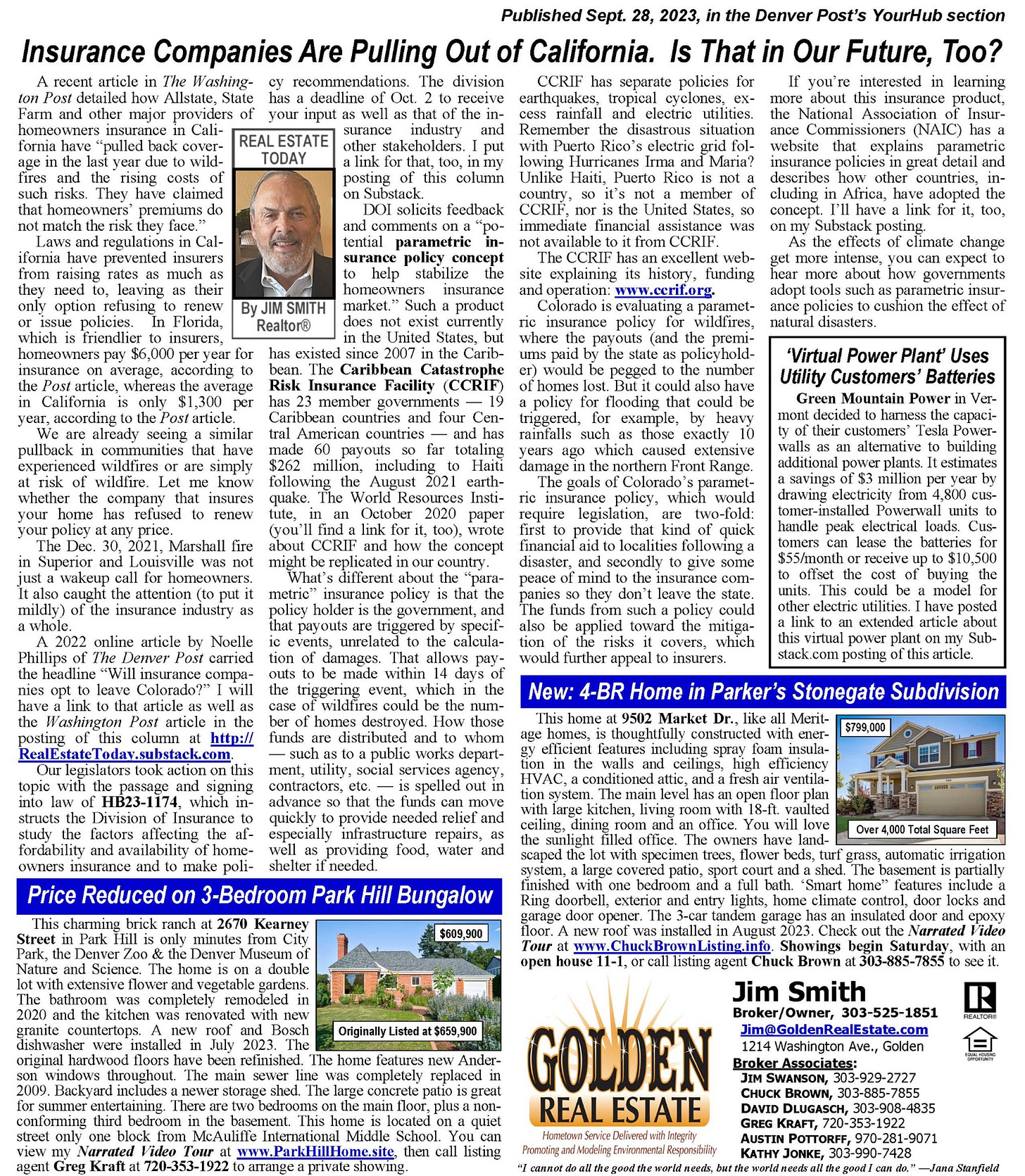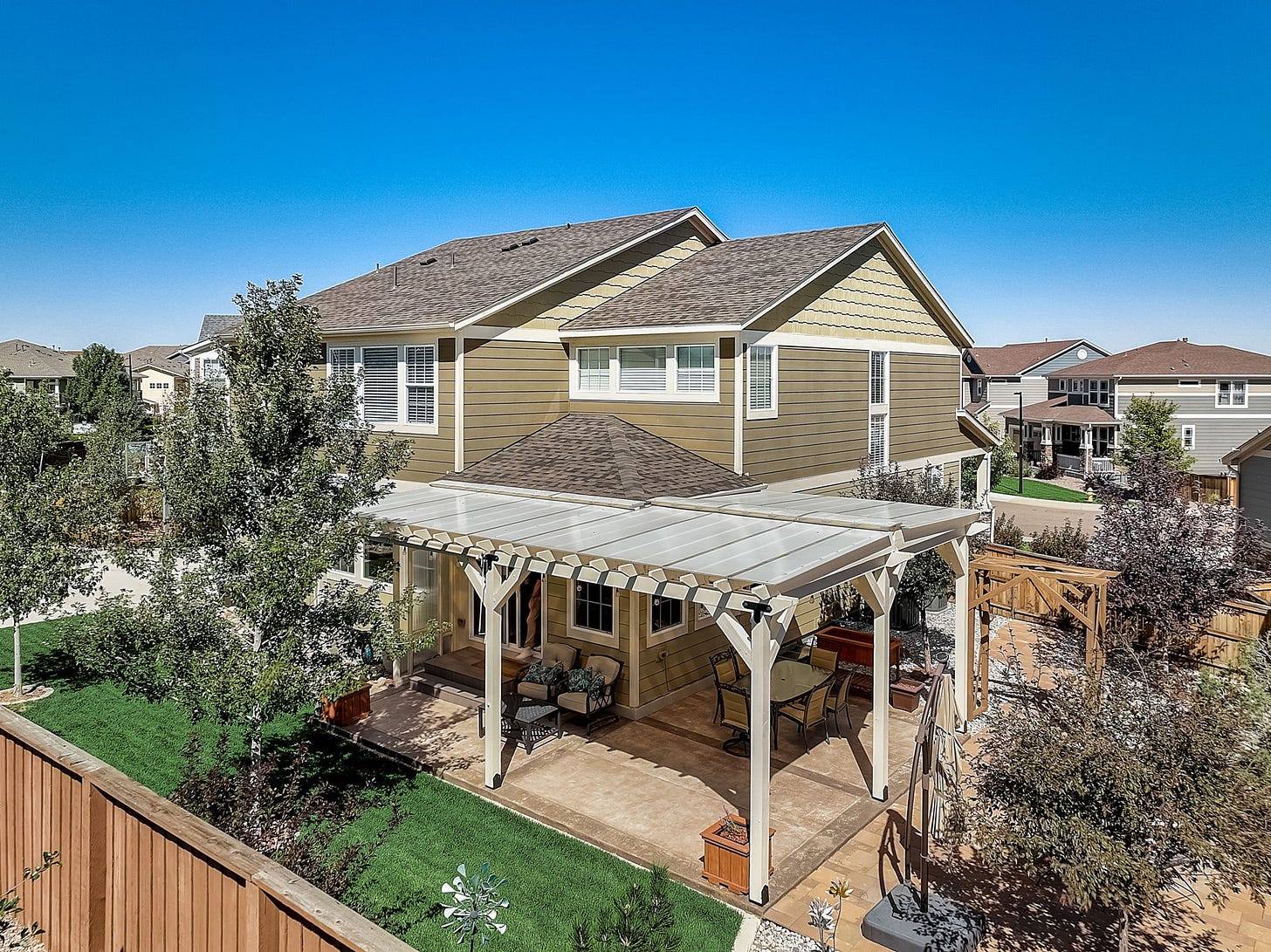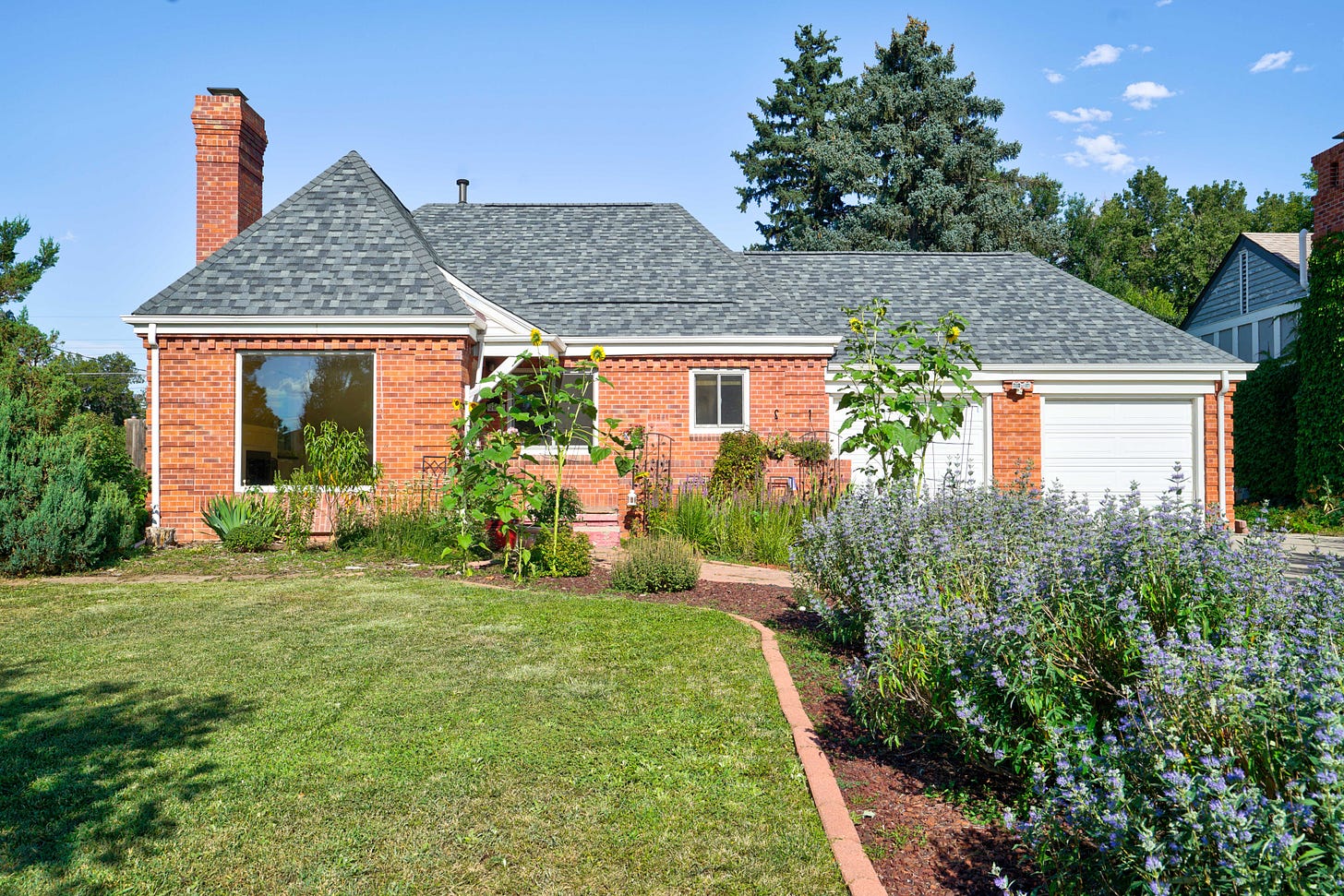Insurance Companies Are Pulling Out of California. Is That in Colorado's Future, Too?
My Sept. 28th column as published in The Denver Post includes a secondary article about Vermont's "Virtual Power Plant" plus two listings. Click on the image of it below to see a PDF of that ad.
[Note: Bold underlined phrases are hyperlinks to the documents mentioned.]
A recent article in The Washington Post detailed how Allstate, State Farm and other major providers of homeowners insurance in California have “pulled back coverage in the last year due to wildfires and the rising costs of such risks. They have claimed that homeowners’ premiums do not match the risk they face.”
Laws and regulations in California have prevented insurers from raising rates as much as they need to, leaving as their only option refusing to renew or issue policies. In Florida, which is friendlier to insurers, homeowners pay $6,000 per year for insurance on average, according to the Post article, whereas the average in California is only $1,300 per year, according to the Post article.
We are already seeing a similar pullback in communities that have experienced wildfires or are simply at risk of wildfire. Let me know whether the company that insures your home has refused to renew your policy at any price. My email is jim@goldenrealestate.com.
The Dec. 30, 2021, Marshall fire in Superior and Louisville was not just a wakeup call for homeowners. It also caught the attention (to put it mildly) of the insurance industry as a whole. A 2022 online article by Noelle Phillips of The Denver Post carried the headline “Will insurance companies opt to leave Colorado?”
Our legislators took action on this topic with the passage and signing into law of HB23-1174, which instructs the Division of Insurance to study the factors affecting the affordability and availability of homeowners insurance and to make policy recommendations. The division has a deadline of Oct. 2 to receive your input as well as that of the insurance industry and other stakeholders.
The DOI solicits feedback and comments on a “potential parametric insurance policy concept to help stabilize the homeowners insurance market.” Such a product does not exist currently in the United States, but has existed since 2007 in the Caribbean. The Caribbean Catastrophe Risk Insurance Facility (CCRIF) has 23 member governments — 19 Caribbean countries and four Central American countries — and has made 60 payouts so far totaling $262 million, including to Haiti following the August 2021 earthquake. The World Resources Institute, in an October 2020 paper, wrote about CCRIF and how the concept might be replicated in our country.
What’s different about the “parametric” insurance policy is that the policy holder is the government, and that payouts are triggered by specific events, unrelated to the calculation of damages. That allows payouts to be made within 14 days of the triggering event, which in the case of wildfires could be the number of homes destroyed. How those funds are distributed and to whom — such as to a public works department, utility, social services agency, contractors, etc. — is spelled out in advance so that the funds can move quickly to provide needed relief and especially infrastructure repairs, as well as providing food, water and shelter if needed.
CCRIF has separate policies for earthquakes, tropical cyclones, excess rainfall and electric utilities. Remember the disastrous situation with Puerto Rico’s electric grid following Hurricanes Irma and Maria? Unlike Haiti, Puerto Rico is not a country, so it’s not a member of CCRIF, nor is the United States, so immediate financial assistance was not available to it from CCRIF.
The CCRIF has an excellent website explaining its history, funding and operation: www.ccrif.org.
Colorado is evaluating a parametric insurance policy for wildfires, where the payouts (and the premiums paid by the state as policyholder) would be pegged to the number of homes lost. But it could also have a policy for flooding that could be triggered, for example, by heavy rainfalls such as those exactly 10 years ago which caused extensive damage in the northern Front Range.
The goals of Colorado’s parametric insurance policy, which would require legislation, are two-fold: first to provide that kind of quick financial aid to localities following a disaster, and secondly to give some peace of mind to the insurance companies so they don’t leave the state. The funds from such a policy could also be applied toward the mitigation of the risks it covers, which would further appeal to insurers.
If you’re interested in learning more about this insurance product, the National Association of Insurance Commissioners (NAIC) has a website that explains parametric insurance policies in great detail and describes how other countries, including in Africa, have adopted the concept.
As the effects of climate change get more intense, you can expect to hear more about how governments adopt tools such as parametric insurance policies to cushion the effect of natural disasters.
‘Virtual Power Plant’ Uses Utility Customers’ Batteries
Tesla introduced the Powerwall in 2015 as a home battery storage device to provide backup during power outages. As of June 2023, there are 500,000 of the units deployed worldwide, and the Nevada factory is making 6,500/week.
Green Mountain Power in Vermont decided to harness the capacity of their customers’ Powerwalls as an alternative to building additional power plants. It estimates a savings of $3 million per year by drawing electricity from 4,800 customer-installed Powerwall units to handle peak electrical demands. Customers can pay $55 per month to have the units installed free or can purchase their own units, receiving up to $10,500 to offset their costs. Perhaps this will be a model for other electric utilities. The cost of doing so was presumably a big savings over building an additional power plant to handle peak loads. Here’s a link to an extended article about Vermont’s virtual power plant.
Just Listed: Energy-Efficient Meritage Home in Parker’s Stonegate Subdivision
This home at 9502 Market Dr., like all Meritage homes, is thoughtfully constructed with energy efficient features including spray foam insulation in the walls and ceilings, high efficiency HVAC, a conditioned attic, and a fresh air ventilation system. It was just listed by Chuck Brown for $735,000. The main level has an open floor plan with large kitchen, living room with 18-ft. vaulted ceiling, dining room and an office. You will love the sunlight filled office. The owners have landscaped the lot with specimen trees, flower beds, turf grass, automatic irrigation system, a large covered patio, sport court and a shed. The basement is partially finished with one bedroom and a full bath. ‘Smart home” features include a Ring doorbell, exterior and entry lights, home climate control, door locks and garage door opener — all controllable on a smartphone app. The 3-car tandem garage has an insulated 8-foot-tall door and epoxy floor. A new roof was installed in August 2023. Check out the Narrated Video Tour at www.ChuckBrownListing.info. Showings begin Saturday, Sept. 30th, with an open house 11-1, or call listing agent Chuck Brown at 303-885-7855 to see it.
Price Reduced on a 3-Bedroom Park Hill Brick Ranch
This charming brick ranch at 2670 Kearney Street in Park Hill is only minutes from City Park, the Denver Zoo & the Denver Museum of Nature and Science. Originally listed for $659,000, it is now listed for $50,000 less! The home is on a double lot with extensive flower and vegetable gardens. The bathroom was completely remodeled in 2020 and the kitchen was renovated with new granite countertops. A new roof and Bosch dishwasher were installed in July 2023. The original hardwood floors have been refinished. The home features new Anderson windows throughout. The main sewer line was completely replaced in 2009. Backyard includes a newer storage shed. The large concrete patio is great for summer entertaining. There are two bedrooms on the main floor, plus a non-conforming third bedroom in the basement. This home is located on a quiet street only one block from McAuliffe International Middle School. You can view my Narrated Video Tour at www.ParkHillHome.site, then call listing agent Greg Kraft at 720-353-1922 to arrange a private showing.






